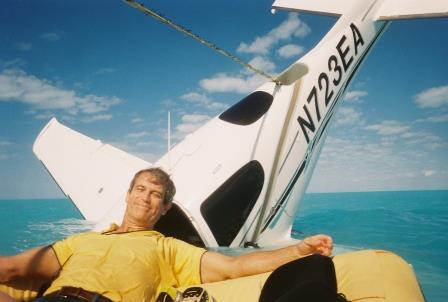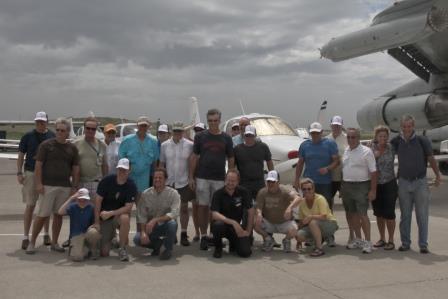"Few will have the greatness to bend history itself, but each of us can work to change a small portion of events. It is from numberless diverse acts of courage and belief that human history is shaped. Each time a man stands up for an ideal, or acts to improve the lot of others, or strikes out against injustice, he sends forth a tiny ripple of hope, and crossing each other from a million different centers of energy and daring those ripples build a current which can sweep down the mightiest walls of oppression and resistance." -- Robert F. Kennedy
It's safe to say that when Robert Kennedy spoke these words he was not imagining Dr. Dick McGlaughlin and his single engine Cirrus plane drifting downward into the Caribbean. But when Dr. Mac went down over Andros, Bahamas in January of 2012, the ripples that formed as the plane splashed into the water swept out slowly towards Haiti. This past weekend we at the St. Luke Foundation gratefully received these ripples as they reached our shores. The short version of the story seems worth telling.

Dr. Mac began coming to Haiti shortly after the earthquake, working with various groups both as a doctor and as a pilot bringing supplies and medical expertise. Mac worked first in the countryside and then in Port au Prince, as he and several other Cirrus pilots brought much needed supplies in the days after the earthquake. In late 2010, as the bacterium Vibrio Cholerae leaked tragically into the Artibonite River and spread to Port au Prince, Dr. Mac began coming more frequently, and through a friend's referral he landed at St. Luke's Hospital in Tabarre.
Dr. Mac is a Gastro-Intestinal doctor from Birmingham, Alabama. He is charismatic and humble, and he loves his work. For several months he came to treat cholera for a week each month, which provided a life-saving and invaluable help. The cholera epidemic represented the second tragic disaster in a year, and as with the earthquake, St. Luke's organized quickly and saved many, to date treating nearly 40,000 cholera patients. St. Luke's transitioned quickly to a fully Haitian staffed response, which is the model for all of our programs. After a few months, with our cholera center well-staffed, Mac was left wondering how he might help further.
Haitian professionals and doctors lead the programs at St. Luke's, with foreigners coming mainly to teach and learn from our Haitian staff as part of a comprehensive continuing education program. Mac knew this, and when he met Dr. Nathalie Colas, a talented young Haitian physician, he saw a future G.I. doctor, and approached our Medical Direction about starting a G.I. Lab at St. Luke's Hospital. He transitioned from cholera treatment and started working intensively with Dr. Colas, bringing down scopes and materials to form a new and much needed specialty at St. Luke's Hospital. He'd been coming to Haiti for about a year, one week each month, when he decided to bring his daughter Elaine down to see the hospital and meet the staff.
They left Birmingham on a beautiful morning in January. Mac excited to show what he'd been doing with his time, and his daughter Elaine excited to learn. About three hours into the trip the plane lost oil pressure. Mac turned toward the closest island, stayed calm, and checked the gauges. It lost more pressure. And then the engine failed. As the plane went down Mac deployed the parachute, which on such a small plane serves as a parachute for the plane itself, not to the pilot. Father and daughter coasted down gently, with perhaps just a touch of apprehension, and within moments they were smiling and posing for pictures in front of the plane, safe on rafts, in clear blue Caribbean waters. From there they made it to Nassau, then to Miami, then straight to Port au Prince to meet the appointments that Mac had made with Dr. Colas and her patients. At home in the States word spread of the crash, and the ripples began to build out.
COPA stands for Cirrus Owners and Pilots Association and is a network of several thousand men and women, who own, operate and fly the four-seat, single-engine propeller-driven plane that Mac was flying that day. They are dependable planes, with a good reputation, so naturally when one went down, it attracted attention. Mac had been posting blogs about Haiti for months by then, and many pilots had read of his experiences. A handful had gotten involved, asked questions and even donated money, eventually raising enough to build several houses in Cite Soleil where our St. Luke team has deep roots and community based programs.
After the crash others became interested, one of whom was Luke Lysen, founder of The Flight Academy based in Seattle, and a Cirrus expert and enthusiast. Together Luke and Mac formed a plan to raise $50,000 for St. Luke's and send a caravan of planes down to Haiti with medical supplies. Luke wrote friends, colleagues and students. Mac posted on the COPA blog. Dominoes fell and ripples spread further. Last weekend, after a few months of planning, 31 pilots and their friends flew in 15 planes carrying supplies and resources to St. Luke's in Haiti. They raised over $100,000 and came to learn more about the great and unheralded work of a courageous group of Haitian led doctors and staff that manage two hospitals, two maternity clinics, thirty schools, a job training and production center, and much more.
What is particularly important about this story, about the spreading of these ripples, is that it provides a seldom seen example of how international engagement can work. St. Luke Haiti does not pay foreign staff. There are no high dollar consultants, no rents paid for offices, no bills that cut into funds given by generous donors. St. Luke Haiti's fundraising is based in friendship, and the friends and supporters grow one ripple at a time. One hundred percent of donations to St. Luke Haiti go to Haitian programs and Haitian people. We rely on our friends. Friends in Italy, friends in Germany, friends in Hollywood, friends in the Catholic Church. Friends from all over stand together and do what they can to help, inspired and encouraged by the work of our Haitian staff.

This example of COPA is instructive. Dr. Mac came to Haiti. He was enamored by the people, the Haitian leadership, and the important work being done. He went home, he told his network of friends and colleagues, and they stood with him. Last weekend, a group of pilots previously united by a love of flying became a bit more united by their belief in the St. Luke's mission. The head of a dairy farm from Pittsburgh flew 55 hours from Alaska. The director of sales from a Chicago company brought his 13 year old son (an aspiring doctor and remarkable kid). With them came support from a computer systems entrepreneur from New Orleans, a plastic surgeon from Annapolis, an entrepreneur and astrophysicist student from Austin, a school director from Boulder, a cardiologist from New Orleans, a retired businessman from Connecticut, a financial portfolio manager from Tampa...the list goes on. These are just a few examples from a diverse group that stood together with Dr. Mac to support a Haitian vision that confronts the challenges of their country. At St. Luke's the motto is "If not us, who? If not now, when?" Our new friends at COPA acted out this philosophy last weekend, and stood in support of the work of our courageous Haitian staff. Their friendship and action saved lives and pushed ripples of hope a little further along the water that we all share.